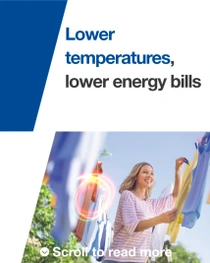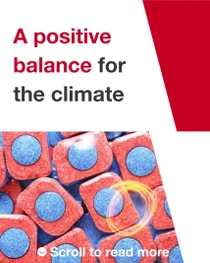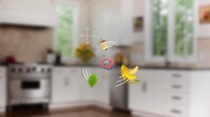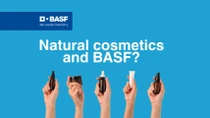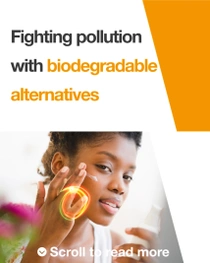We create change
Innovating for a cleaner future
From shampoos and creams to detergents and dishwasher tablets, these everyday essentials in our homes undoubtedly simplify our lives. Yet, their production and use demand a balance between customer needs and environmental impact. That’s why BASF is developing innovative solutions designed to achieve top cleaning performance for consumers and to help make the world a cleaner place.
Many believe that hot water is essential for removing stains from dirty laundry. But this leads to higher energy consumption and a higher impact on the planet. So how can we have perfectly cleaned towels and reduce our energy bills at the same time? One answer is switching to a detergent that provides the same results at cooler temperatures.
BASF is the leading supplier of cleaning ingredients to top household brands worldwide; ingredients that are used to create high-performance laundry detergents for spotless results on the toughest stains.
Read more about the secret to clean laundry: biotechnology assistants
In liquid, single-dose, and powder form, BASF ingredients help you remove ground-in dirt, keep your whites white and your clothes looking new for longer, and work effectively at temperatures as low as 20 °C. Helping to make your laundry cooler and cleaner.
Did you know that the ingredients in your detergents or dishwasher tabs could help reduce CO2 emissions? Many ingredients in everyday products can be derived from fossil fuels, such as crude oil and natural gas, or from renewables. Now, in a joint commitment with Henkel, BASF’s biomass balance concept is being used to increase the amount of renewable raw materials used in the manufacture of ingredients for their laundry and home care products, as well as their hair and body care products.
The four-year collaboration will increase the amount of renewable raw materials used to manufacture ingredients for products from Henkel’s core consumer brands such as Somat, Perwoll, Schauma, Gliss, Syoss, Fa and Persil. Compared to conventional ingredients, the renewable-based ingredients will reduce around 200,000 metric tons of CO2 emissions.
Silicone is used as an ingredient in many skin care, hair care, and color cosmetic products such as water-resistant sunscreens and shampoos for shiny hair. However, it can clog pores, block essential oils, and its rinse-off particles inevitably end up in wastewater.
To address these challenges and meet the consumer trend for ‘clean beauty’, BASF has developed a range of alternative ingredients solutions to traditional silicones which provide great performance while maintaining environmental integrity. These silicone alternatives are made from renewable raw materials, which can also help to reduce the carbon footprint of skin care formulations.
Every year, millions of tons of plastic end up in our soils and waters, where they can take hundreds of years to break down. Consumers are demanding products free from ingredients that have a negative impact on the environment. But at the same time, they still expect outstanding performance. Biopolymers can offer a sustainable alternative to this challenge.
To address the issue of plastic pollution, BASF is developing a range of bio-based and biodegradable ingredients for home and personal care products. These materials are derived from renewable resources and break down naturally, reducing microplastics and greenhouse gas emissions in the environment, while offering comparable performance to traditional ingredients.
BASF biopolymers offer a sustainable alternative to surfactants and polymers in everyday products such as detergents, soaps, and shampoos. When these products reach wastewater treatment plants, activated sludge microbes—naturally present in soil and compost—break down the biopolymers completely into CO2, water, biomass, and minerals. This process ensures that fewer microplastics are released back into our water systems.

